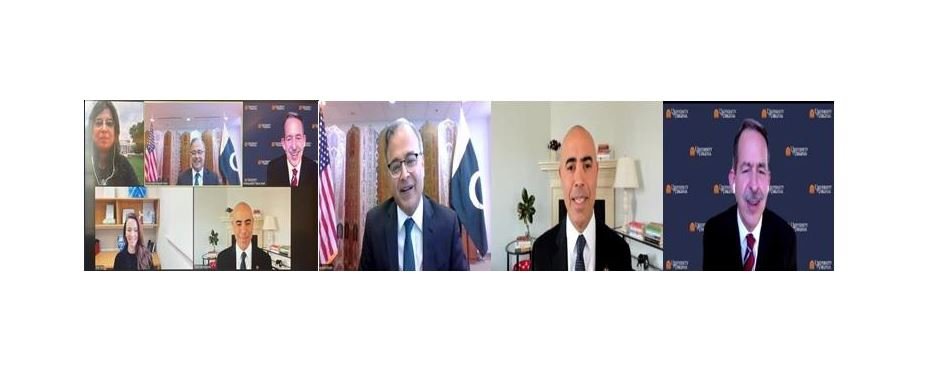Washington DC, 27 January 2022 (TDI): The Ambassador of Pakistan to the United States (US), Dr. Asad Majeed Khan participated in a virtual event on the invitation of the University of Virginia (UVA).
The theme of the event was Pakistan-US relations and regional dynamics in South Asia. It was moderated by the Vice Provost for Global Affairs of UVA, Ambassador Steve Mull. Whilst the Dean, Batten School for Public Policy, Ian Solomon delivered the welcoming remarks.
Enjoyed a wide ranging conversation on Pakistan🇵🇰 this afternoon with Ambassador Steve Mull (@SteveMullUSA), distinguished Dean @ianhsolomon and students @GlobalUVA. @PakinUSA @ForeignOfficePk @FMPublicDiploPK pic.twitter.com/jnJJVjZXZT
— Asad M. Khan (@asadmk17) January 25, 2022
Dr. Asad Majeed Khan highlighted the vibrant cultural and civilizational heritage of Pakistan in his opening remarks. He accentuated the country’s geostrategic significance and its breathtaking landscape.
Furthermore, the Ambassador talked about the geo-economic vision of the Pakistani government that is anchored in enhanced intra-regional trade and connectivity. With this policy, the government aims to tap the immense potential offered by its enterprising people as well as its tremendous natural resources.
During the virtual conversation, commenting on Pak-US relations, the Ambassador stated that both countries were celebrating the 75th Anniversary of the establishment of diplomatic relations this year.
He expressed that a wholesome momentum of high-level bilateral interactions had been created during the past year. Institutional dialogues on the issues of energy and climate had already taken place between the two partners.
However, dialogues on trade, investment, and health sectors will be held soon. Ambassador Asad further underscored that the US is still the largest export market as well as the major source of foreign remittances for Pakistan.
In addition, whilst addressing the virtual event, the Ambassador lauded the significant role played by the Pakistani-American diaspora as it has served as a bridge-builder between the two countries and their societies.
Aside from that, the Ambassador of Pakistan also spoke on the issue of Afghanistan. He enunciated that there was like-mindedness between the US and Pakistan on the requirement for peace and stability in the country.
Moreover, US and Pakistan share the common outlook of assuring that Afghanistan is not used for terrorist activities. US and Pakistan are cognizant of the significance of an inclusive government in the country as well as the protection of human rights including women’s rights and girls’ education.
Nevertheless, he pointed out that presently, the most pressing issue was to prevent the looming humanitarian crisis and economic collapse in Afghanistan that could cause a refugee crisis. Additionally, such a crisis could lead to a revival of terrorism and narco-trade in the country.
Timely measures to prevent a humanitarian crisis in Afghanistan are important, however, they will only serve as a “Band-Aid”, a temporary solution as much more is required from the global community to build a sustainable economy in Afghanistan.
Ambassador Asad also stressed that a peaceful neighborhood is critical for Pakistan to achieve its vision for geo-economics. Nonetheless, India’s persistent obduracy and refusal to create a conducive backdrop for discourse with Pakistan on all issues including the core dispute of Jammu and Kashmir, has impeded the economic development of South Asia.
Independent analysts around the world were also voicing concern over increasing illiberalism, democratic down sliding, and human rights violations of minorities all across India including a possible genocide of Muslims.
Lastly, the Ambassador stated that the circumstances in IIOJK were especially alarming as India had amplified its inhumane suppression of the people of IIOJK. Besides, the international community has a moral obligation to pressurize India to reverse its unlawful actions of August 5, 2019.
The said actions violate the UNSC Resolutions on Jammu and Kashmir. Likewise, the international community should pressurize India to cease its human rights transgressions in IIOJK and begin a dialogue with Pakistan to resolve the dispute.
The virtual event also included a questions and answers session. It was attended by the students and members of the academia of UVA as well as the think tank community.
I'm a detail-oriented, problem-solving, persistent multitasker. Having a magna cum laude MSc. in Strategic Studies from National Defense University, Pakistan, I believe in peaceful discourse & dialogue and have built my interest in nontraditional security threats.
I am an experienced writer with a primary focus on public policy, environmental security, nuclear strategy, and geopolitics!








